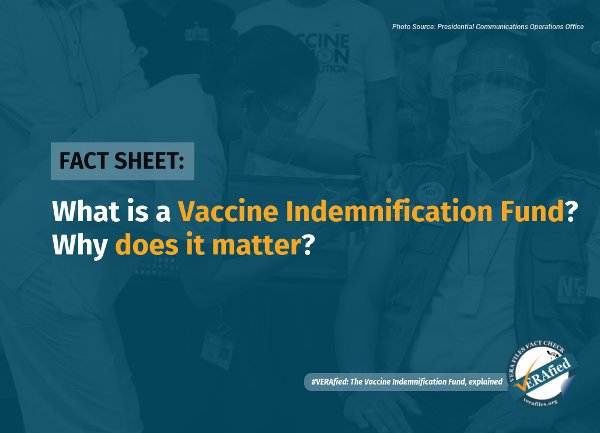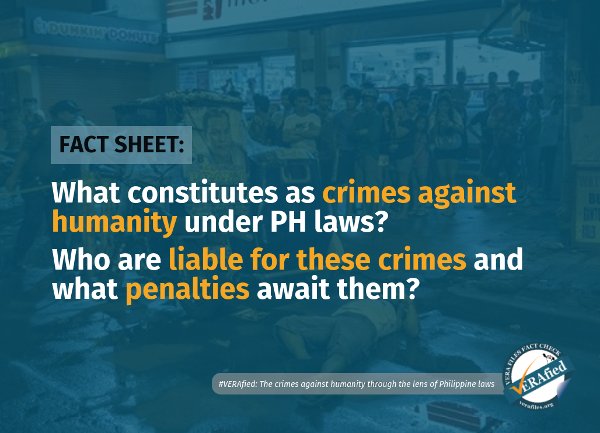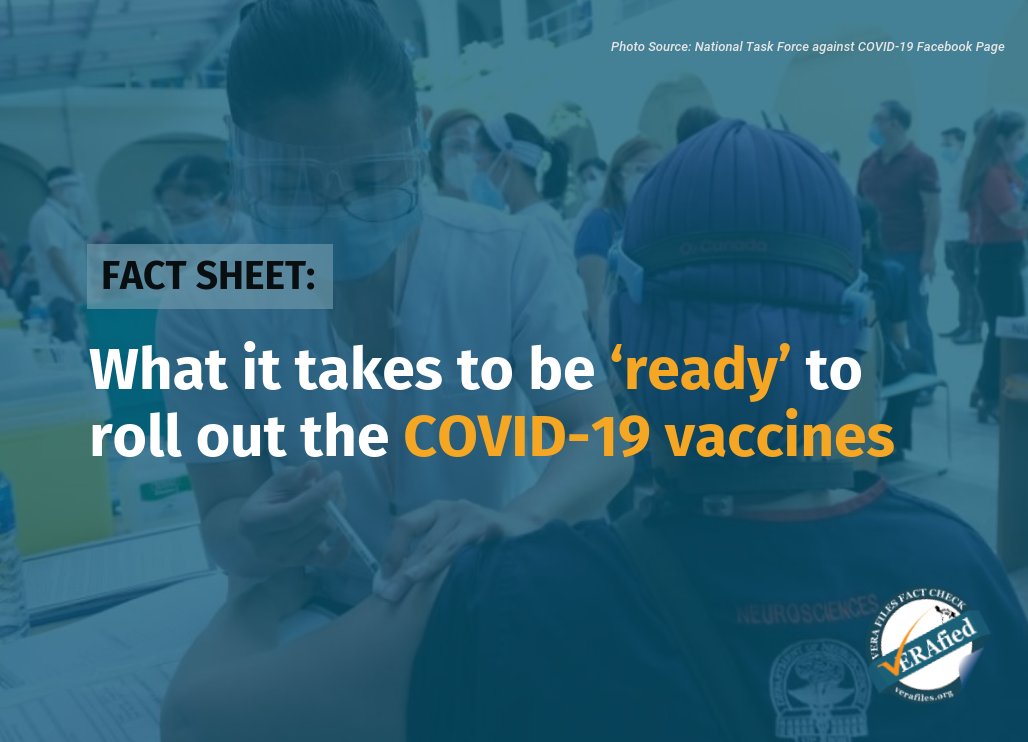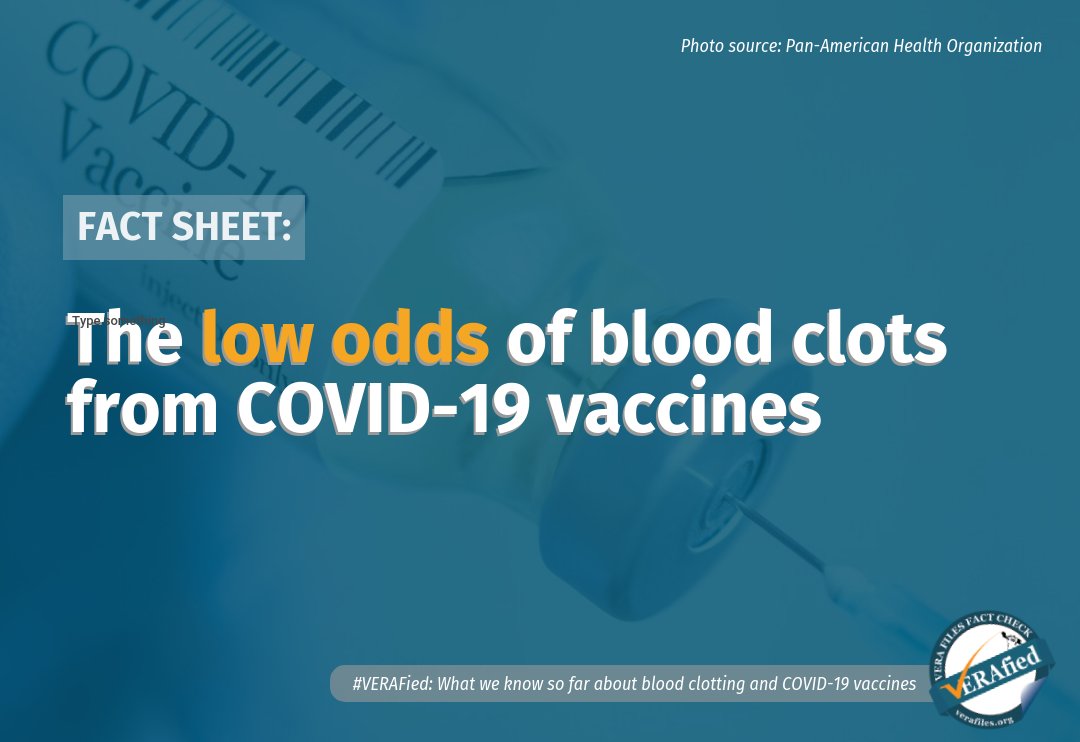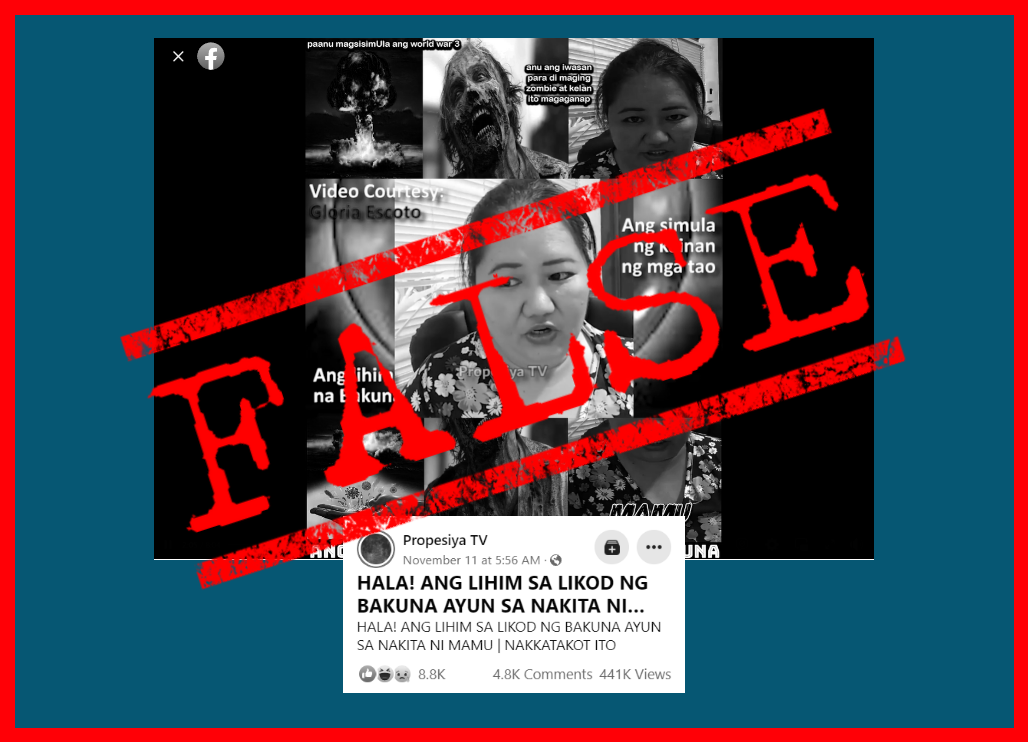After a five-day delay, the much-awaited first shipment of 600,000 doses of the Sinovac vaccine from China arrived in the country on Sunday, Feb. 28. Presidential Spokesman Harry Roque Jr. earlier said the Feb. 23 delivery was already cast in stone, but it wound up being delayed because manufacturers wanted an indemnity agreement.
In the last two weeks of February, Congress rushed a bill that allotted P500 million for a National Vaccine Indemnity Fund. On Feb. 26, two days before the China-donated vaccines arrived, President Rodrigo Duterte signed the bill, now known as Republic Act 11525 or COVID-19 Vaccination Program Act of 2021.
Vaccine czar Carlito Galvez Jr. earlier said manufacturers were wary of supplying the Philippines with COVID-19 vaccines without the government committing to compensate anyone who may experience serious adverse effects (SAEs) after receiving the jab — a consequence of the Dengvaxia controversy.
Had there been an indemnity law, Galvez said during a Feb. 11 Senate hearing, the Pfizer-BioNTech vaccines from the World Health Organization-led (WHO) COVAX facility, a globally pooled procurement and distribution initiative to ensure equitable access to the vaccine, would have arrived in the country by Feb. 12.
Stressing the importance of this mechanism, the vaccine czar said:
“The significant volumes were given by the COVAX and also by the [vaccine] manufacturer[s] can be hindered without this indemnification law.”
Source: Senate of the Philippines Official Youtube Channel, Committee on Finance (February 11, 2021), Feb. 11, 2021, watch from 1:11:46 to 1:11:57
The United Nations International Children’s Emergency Fund (UNICEF), a COVAX partner, mentioned in a document as early as October 2020 that “all participants allocated vaccines through COVAX will be required to indemnify the manufacturer for the vaccines deployed in their territory.”
Cabinet Secretary Karlo Nograles, in a Feb. 22 interview, said Palace officials were “caught by surprise” on the “sudden” requirement of an indemnity agreement, and that they “were under the impression that it wasn’t really a requirement.”
Senate Minority Leader Franklin Drilon said the senators were told “only very recently” that an indemnification law needed to be passed to get the vaccines.
So far, no government official has owned up to the apparent oversight over the indemnification requirement.
What is a vaccine indemnification fund and why does it matter? What steps has the government taken to address this issue?
Here are three things you need to know:
1. What is a vaccine indemnification fund?
A vaccine indemnification fund refers to the allocation by Congress of P500 million from the national government’s P13-billion contingent fund in the 2021 General Appropriations Act to “compensate any person inoculated through the COVID-19 Vaccination Program” in case of death, permanent disability, or hospital confinement for any serious adverse effect.
The Philippine Health Insurance Corp. (PhilHealth) will administer the COVID-19 National Vaccine Indemnity Fund, which was created under RA 11525 as a trust fund. The agency can draw from the fund to compensate the patients.
As fund administrator, PhilHealth, in consultation with the Department of Health (DOH) Department of Finance (DOF), Department of Budget and Management (DBM), and the National Task Force (NTF) on COVID-19, will issue guidelines for its administration and utilization, and determine its sufficiency.
For this purpose, a special task group of medical and vaccine experts will monitor the “probable adverse events” that may arise following the inoculation of the COVID-19 vaccine. The group will issue guidelines for the monitoring, evaluation, investigation, and reporting mechanism for the local government units.
Health workers will monitor vaccinated persons for 30 minutes to one hour for “unusual symptoms” or adverse effects before they are sent home, according to the National Deployment and Vaccination Plan for COVID-19 Vaccines.
Adverse reactions to vaccines may occur and can “range from reactogenic reactions to allergic reactions,” said allergist and clinical immunologist Rommel Lobo of the DOH’s National Adverse Effects Following Immunization Committee (NAEFIC).
Vaccinated Filipinos will be monitored for 12 months for possible side effects, according to physician Dominic Madumba of the Department of Health’s (DOH) Health Promotion Bureau. Section 10 of RA 11525 provides, however, that monitoring will be for five years, or until the government declares completion of the COVID-19 vaccination program, whichever comes first.
2. Why do vaccine manufacturers require indemnification deals? Why is this important?
Manufacturers require indemnification agreements because COVID-19 vaccines are still “under development” and because of the emergency use nature of the jabs, said Health Undersecretary and Spokesperson Maria Rosario Singh-Vergeire in a Feb. 20 press briefing. Such safeguards are important to “cover unexpected serious vaccine-related adverse events” given the “unprecedented speed and scope of the deployment of these vaccines,” according to the Global Alliance for Vaccines and Immunizations (GAVI).
Vergeire also noted that the absence of an indemnification law in the Philippines posed a difficult hurdle for vaccine negotiations. She said:
“Ang atin pong sitwasyon ngayon, ang ibang bansa, they have this law for indemnification, which are existing already in these countries. Pero dito sa ating bansa po kasi, wala po tayong ganyang batas. Kaya mas mahirap po nating gawin iyong negotiation because we do not have a law to support this indemnification agreement.”
(Our situation right now is, other countries have this law for indemnification, which are [sic] existing already in these countries. But in our country, we don’t have that kind of law. That’s why it’s harder for us to negotiate because we do not have a law to support this indemnification agreement].”
Source: PTV Philippines Official Youtube Channel, PANOORIN: Public Briefing #LagingHandaPH | February 20, 2021, Feb. 20, 2021, watch from 44:04 to 44:23
Hence, countries which will be receiving vaccines from the COVAX facility, such as the Philippines, are likewise required to sign indemnity agreements with a “no-fault mechanism and fund” with vaccine manufacturers to be able to receive vaccines cleared for emergency use through COVAX.
“The indemnification clause is something that the manufacturers are demanding from every country, irrespective of whether they are buying through direct purchase from the manufacturer […] or whether they are receiving vaccines through the COVAX facility or some other donor mechanism,” explained WHO Representative to the Philippines Rabindra Abeyasinghe in a Feb. 23 media briefing.
“The requirements and the standard agreements are common to all countries. They’re not specific to the Philippines and they’re not related to any issue that happened in the country relating to Dengvaxia or anything else,” Abeyasinghe clarified in the same briefing.
Indemnification arrangements in which national governments are held accountable are not new.
No-fault vaccine-injury compensation programs have long been legislated in 25 countries, according to a study on the global landscape of such policies, published in 2020.
The same research found, however, that most compensation programs cover cases “from vaccines that are registered in the country and are recommended by authorities for routine use in children, pregnant women, adults, and for special indications.”
The Philippine FDA granted emergency use authorization (EUA) for Pfizer-BioNTech and AstraZeneca vaccines in January.
On Feb. 22, Sinovac was granted an EUA — but not for the elderly and health workers in direct contact with COVID-19 patients — as clinical trial data show that it has an efficacy of 50.4% for the latter group, FDA Director-General Eric Domingo explained in a press briefing.
No indemnification agreement was signed for Sinovac, according to Presidential Spokesperson Harry Roque, adding, however, that with the indemnification law, it will be “applicable to all vaccines.”
3. What steps has the government taken to address the absence of an indemnity law?
In a Jan. 15 Senate hearing, Health Secretary Francisco Duque III asked senators to consider legislating, or including in the Bayanihan 3 Act, the establishment of an indemnification fund for serious adverse events, should there be a “legislative space” to accommodate such a measure.
House Bill 8648 and Senate Bill 2057 were then filed on Feb. 8 and Feb. 16, respectively, to expedite the procurement of COVID-19 vaccines and establish an indemnification fund.
President Rodrigo Duterte certified both measures as urgent, overriding the requirement that the three readings of a bill must be done on separate days.
With a 22-0 vote, the Senate approved the Vaccination Program Act of 2021 on Feb. 23 with an amendment that authorizes LGUs to “directly procure ancillary supplies and services necessary for the storage, transport, development, and administration of COVID-19 vaccines through negotiated procurement under emergency cases.” The House adopted the Senate version of the bill to speed up the legislative process.
Following its enactment on Feb. 26, the first shipment of donated vaccines from China arrived in Manila even before RA 11525 was published in the Official Gazette on March 3.
Sources
Presidential Communications Operations Office (PCOO), Arrival of Sinovac vaccines, a big step in overcoming pandemic, says President Duterte, Feb. 28, 2021
Presidential Communications Operations Office (PCOO), Spox Roque Virtual Press Briefing February 11, 2021, Feb. 11, 2021
GMA News Online, Roque says Dengvaxia gaffe pushed COVID-19 vaccine makers to insist on indemnity agreement, Feb. 19, 2021
Presidential Communications Operations Office (PCOO), Interview with Presidential Spokesperson Harry Roque by Tony Velasquez and Danny Buenafe – On the Spot/Teleradyo, Feb. 19, 2021
Presidential Communications Operations Office (PCOO), On COVID-19 Vaccination Program Act of 2021, Feb. 26, 2021
Official Gazette of the Philippines, Republic Act 11525, Feb. 26, 2021
RTVMalacañang Official Youtube Channel, Situation Briefing and Talk to the People on Typhoon ‘Rolly’ 11/2/2020, Nov. 2, 2020
PTV Philippines Official Youtube Channel, PANOORIN: Public Briefing #LagingHandaPH | February 17, 2021, Feb. 17, 2021
World Health Organization, COVAX: Working for global equitable access to COVID-19 vaccines, Accessed Feb. 11, 2021
Senate of the Philippines Official Youtube Channel, Committee on Finance (February 11, 2021), Feb. 11, 2021
United Nations International Children’s Emergency Fund (UNICEF), COVAX: ensuring global equitable access to COVID-19 vaccines, Accessed Feb. 26, 2021
United Nations International Children’s Emergency Fund (UNICEF), COVAX Facility Update, Oct. 30, 2020
One News PH Official Youtube Channel, AGENDA | February 22, 2021, Feb. 22, 2021
Philstar.com, Government didn’t know about indemnity requirement for vaccines — Palace official, Feb. 22, 2021
Inquirer.net, Pandemic managers raised urgency of indemnity law only in February – senators, Feb. 24, 2021
What is a vaccine indemnification fund?
- Department of Budget and Management, 2021 Contingent Fund, Accessed March 4, 2021
- Department of Health, The Philippine National Deployment and Vaccination Plan for COVID-19 Vaccines: Interim Plan, January 2021
- Official Gazette of the Philippines, Republic Act 11525, Feb. 26, 2021
Why do vaccine manufacturers require indemnification agreements?
- PTV Philippines Official Youtube Channel, PANOORIN: Public Briefing #LagingHandaPH | February 20, 2021, Feb. 20, 2021
- Asian Development Bank (ADB), ADB’s Support to Enhance COVID-19 Vaccine Access, December 2020
- Global Alliance for Vaccines and Immunizations (GAVI), About our Alliance, Accessed March 2, 2021
- PTV Philippines Official Youtube Channel, PANOORIN: Public Briefing #LagingHandaPH | February 20, 2021, Feb. 20, 2021
- World Health Organization, COVAX Statement on WHO Emergency Use Listing for AstraZeneca/Oxford COVID-19 Vaccine, Feb. 16, 2021
- Department of Health, Media Solusyon, Feb. 23, 2021
- World Health Organization (Western Pacific Philippines), WHO Representative in the Philippines: Dr. Rabindra Abeyasinghe, Accessed Feb. 25, 2021
- Public Library of Science One, Global landscape analysis of no-fault compensation programmes for vaccine injuries: A review and survey of implementing countries, May 21, 2020
- Philippine Food and Drug Administration, Emergency Use Authorization (EUA) for Pfizer-BioNTech COVID19 Vaccine Suspension for IM Injection, Jan. 14, 2021
- Philippine Food and Drug Administration, Emergency Use Authorization (EUA) for COVID-19 Vaccine (ChAdOx1- S[recombinant]) (COVID-19 Vaccine AstraZeneca), Jan. 28, 2021
- PTV Philippines Official Youtube Channel, WATCH: Press briefing with Presidential Spokesperson Harry Roque | February 22, 2021, Feb. 22, 2021
What happens after a person gets COVID-19 vaccine shots?
- Department of Health Official Facebook Page, DOH Beat COVID-19 Media Forum February 08, 2021, Feb. 8, 2021
- Department of Health Official Facebook Page, Town Hall on COVID-19 Vaccine Deployment with the Patient Groups, Feb. 23, 2021
What steps has the government taken?
- Senate of the Philippines Official Youtube Channel, Committee of the Whole (January 15, 2021), Jan. 15, 2021
- House of Representatives of the Philippines, HB 8648, Feb. 8, 2021
- Senate of the Philippines, Senate Bill 2057, Feb. 16, 2021
- Presidential Communications Operations Office, On the signing of the Memorandum Order exceeding the 15% limit on advanced payments and Certification of Urgency of the Vaccine Indemnification Bill, Feb. 18, 2021
- Senate of the Philippines, Legislative Process, Accessed Feb. 28, 2021
- Senate of the Philippines, COVID-19 VACCINATION PROGRAM ACT OF 2021, Accessed Feb. 25, 2021
- Official Gazette of the Philippines, Republic Act 11525, March 3, 2021
(Guided by the code of principles of the International Fact-Checking Network at Poynter, VERA Files tracks the false claims, flip-flops, misleading statements of public officials and figures, and debunks them with factual evidence. Find out more about this initiative and our methodology.)
